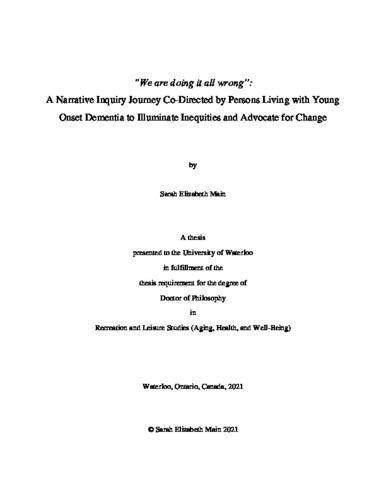| dc.description.abstract | In recent years more attention and concerns are being drawn to the noticeable increase in diagnoses of young onset dementia (YOD), that is individuals who are diagnosed with dementia and are under the age of 65 years. This increase is partially attributed to the high density of the Canadian population that are between the ages of 25 and 64. Despite the growing numbers, there remains a lack of awareness about, and support services for younger persons with dementia and their families, potentially contributing to early institutionalization. A time of crisis, such as with the onset of the COVID-19 pandemic, is particularly harmful for persons with YOD and their families, as not only are there not enough support services available, but persons who are admitted to long-term care (LTC) facilities are at a higher risk of experiencing inhumane treatment or exposure to the illness. This research aimed to gain a deeper understanding of the experiences of persons living with YOD, with hope that the impactful stories shared will create awareness around what it is like to live with young onset, and the steps that need to be taken to better support individuals and their families. As there is little research to-date that privileges the voices of younger persons with dementia, bringing their stories to the forefront of this research was of the utmost importance.
This critical narrative inquiry (CNI) project, informed by Critical Gerontology (CG), Critical Disability Studies (CDS), and other critical theoretical frameworks, had three main purposes, which were to: illuminate how younger persons with dementia story their experiences of YOD and with the LTC system; 2) open spaces for persons living with YOD to collectively reflect on their experiences and engage in dialogic processes; and 3) develop a collaborative and synergistic narrative representation that illuminates experiences and paths for positive change in dementia care. To achieve these aims, this project had two guiding questions, which included: 1) What stories do persons with YOD share about their experiences of YOD and with the LTC system? and 2) What do persons with YOD need to live well that needs to be considered in a re-imagination of caring for persons with YOD?
Using participatory methods and a series of storytelling workshops with six individuals living with YOD, four overarching narratives were created and comprised a total of 11 embedded narrative dialogues that reflect the experiences and viewpoints of the co-researchers. These narratives were presented in the form of podcast scripts, which will be integrated into an interactive multimodal e-flipbook that is continuing to take shape beyond this dissertation.
Overarching narratives included: Shifting to New Realities, Recognizing and Resisting Ostracism, Learning from Past and Present, and Looking to the Future. The 11 embedded storylines included: Podcast 1A: “You better hope it’s not dementia” - Diverse Journeys to Diagnosis, Podcast 1B: “You can’t drive anymore” - Experiences of Losing a Driver’s License, Podcast 1C: “They weren’t downsizing, I just got the boot” - Forced Transitions Out of Employment, Podcast 1D: “How you have to give up things is ridiculously hard” - Navigating Financial Challenges, Podcast 2A: “Stigma follows us wherever we go” - Stories of Stigma and Challenging Stigma, Podcast 2B: “They don’t want to be part of your life” - The Impact of Stigma on Relationships, Podcast 3A: “Oh no sorry, it’s only for people 65 and older” - Current Realities of Community-Based Supports, Podcast 3B: “You hear the lock behind us” - Perceptions of Long-Term Care, Podcast 3C: “It’s a complicated topic” – Palliative and End of Life Care Options and Considerations, Podcast 4A: “Dementia’s given me something to get excited about” – Hopes and Aspirations for Living Well with Young Onset Now and in the Future, and Podcast 4B: “It’s like the hamster on the wheel” - Hopes and Aspirations Related to Care and Support.
From the perspectives of persons with YOD, findings inform the steps that need to be taken to better support persons with young onset in living well with dementia. The stories and dialogues shared send powerful messages about the inequities experienced by persons with young onset, how individuals resist and challenge stigmatization and discriminatory practices, and the changes that need to be made to protect human rights and to make our society and the healthcare system more inclusive. | en |

